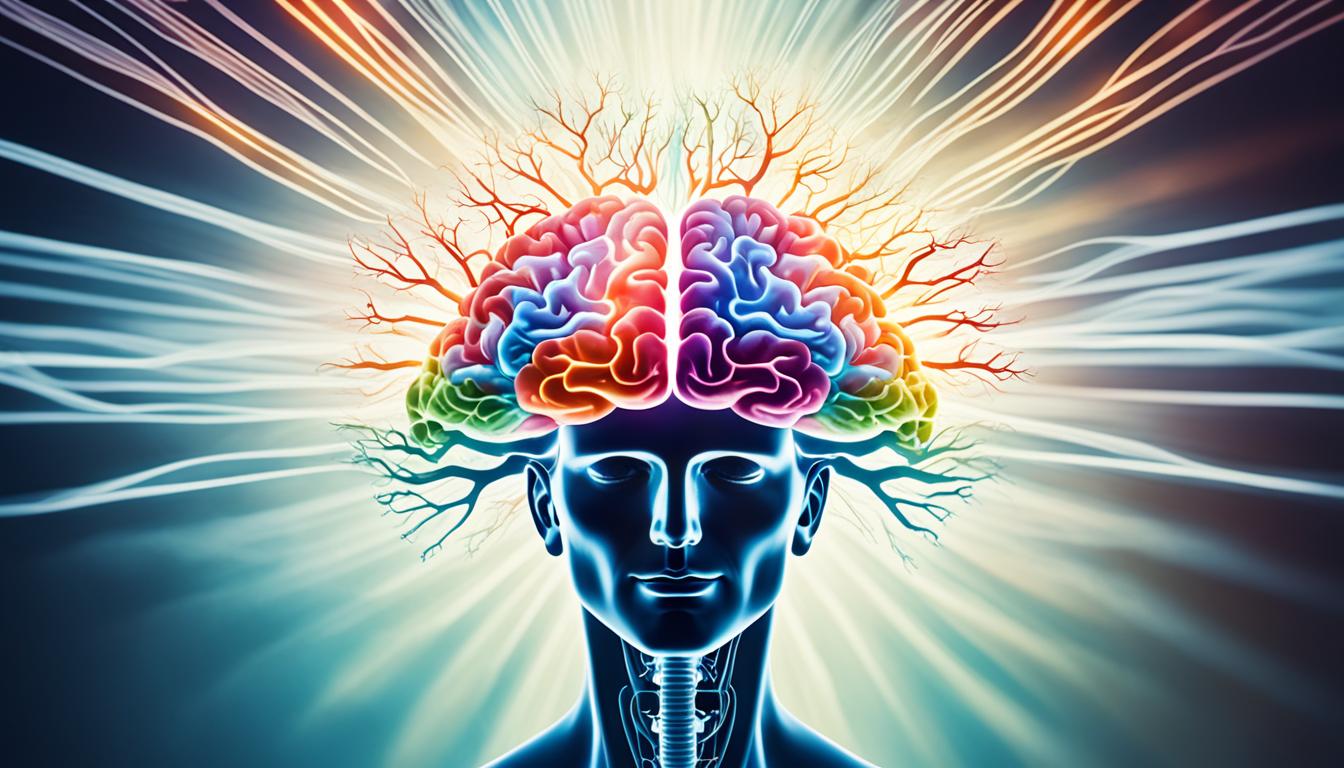Brain Wake-Up Time: What You Need to Know
Have you ever wondered what time your brain fully wakes up and becomes alert? Understanding the brain’s wake-up time is crucial for optimizing cognitive performance and functioning at our best throughout the day. The brain’s wakefulness is influenced by various factors, including the circadian rhythm, sleep and wake patterns, and the role of neurotransmitters.
The circadian rhythm is our internal biological clock that regulates our sleep-wake cycles. It determines when we feel sleepy and when we naturally wake up. Our brain’s wake-up time is closely aligned with this rhythm, which is influenced by external cues such as light and temperature.
Neurotransmitters in the brain, such as norepinephrine, histamine, and serotonin, play a crucial role in keeping the brain awake and alert. These chemicals help maintain cognitive performance and aid in tasks requiring focus and attention. On the other hand, adenosine, a neurotransmitter that promotes drowsiness, builds up in the blood while we are awake, signaling the need for sleep.
Our sleep-wake homeostasis and the internal biological clock work together to regulate our sleep and wake patterns. The sleep-wake homeostasis tracks the need for sleep, creating a sleep drive that increases with each waking hour and promotes deeper sleep after sleep deprivation. The internal biological clock, located in the suprachiasmatic nucleus (SCN) in the brain, is sensitive to light and triggers the release of hormones that help us wake up in the morning and get ready for sleep at night.
Sleep is crucial for brain function and overall health. During sleep, the brain strengthens neural connections, clears out toxins that build up during waking hours, and consolidates memories. Sleep deprivation can negatively impact cognitive performance, mood, and thinking abilities.
Key Takeaways:
- The brain’s wake-up time is influenced by the circadian rhythm and sleep patterns.
- Neurotransmitters like norepinephrine, histamine, and serotonin help keep the brain awake and alert.
- Sleep is crucial for brain function, memory consolidation, and overall well-being.
- Lack of sleep can negatively impact cognitive performance, mood, and thinking abilities.
- Prioritizing regular and adequate sleep is essential for optimal brain function.
The Importance of Sleep for Brain Function
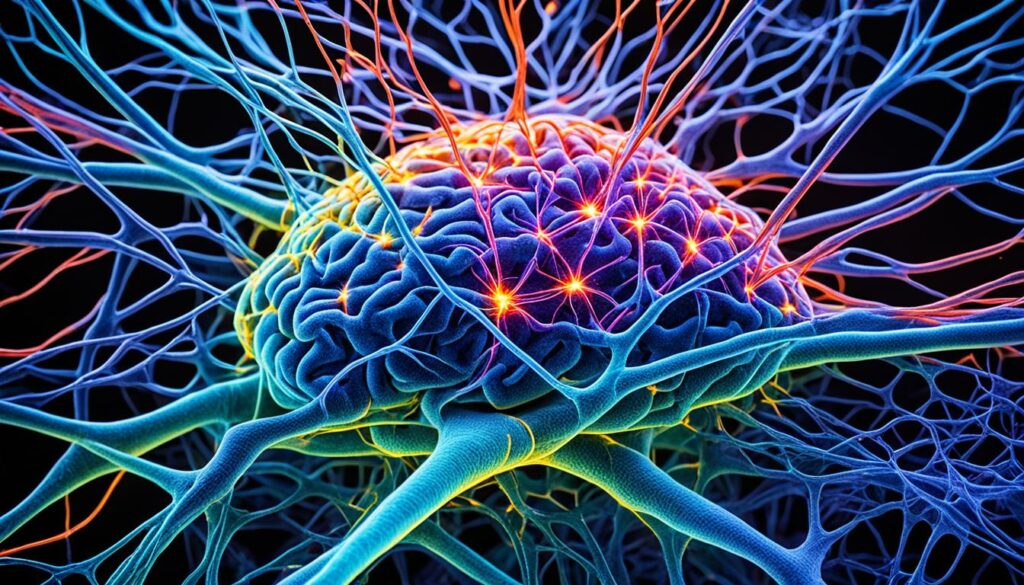
Sleep is an essential component of maintaining optimal brain function. It plays a crucial role in various aspects of cognitive performance, allowing the brain to consolidate memories, enhance learning, and regulate emotions. By understanding the importance of sleep for brain health, we can prioritize restful nights to maximize our cognitive abilities.
During sleep, the brain actively works to maintain and strengthen neural connections, which are vital for learning and memory retention. This process, known as synaptic plasticity, allows the brain to consolidate information gathered throughout the day and form new associations.
Additionally, sleep serves as an opportunity for the brain to flush out accumulated toxins that build up during periods of wakefulness. Research has shown that certain neurochemicals in the brain, such as beta-amyloid, a protein associated with Alzheimer’s disease, are eliminated more efficiently during sleep.
Different sleep stages, such as rapid eye movement (REM) sleep and non-REM sleep, contribute to different aspects of brain function. REM sleep, characterized by vivid dreaming and rapid eye movements, is closely linked to emotional regulation and creative thinking. Non-REM sleep, on the other hand, is associated with the consolidation of declarative memories and motor skills.
REM sleep plays a crucial role in emotional regulation, allowing the brain to process and make sense of daily experiences. It is during this stage that the brain weaves together fragmented memories and extracts the emotional salience of events.
| Sleep Stage | Brainwave Patterns | Neurochemical Activity |
|---|---|---|
| REM Sleep | Rapid eye movements, vivid dreaming | Increased acetylcholine, decreased norepinephrine |
| Non-REM Sleep | Slow delta waves (deep sleep), spindles and K-complexes (light sleep) | Decreased neurotransmitter activity for arousal |
Neurotransmitters, such as GABA, play a critical role in promoting sleep by reducing activity in arousal centers of the brain. GABA acts as an inhibitory neurotransmitter, calming down neural circuits and inducing a state of relaxation. By incorporating healthy sleep habits into our daily routines, we can ensure sufficient GABA production and promote restful sleep.
Sleep deprivation, whether acute or chronic, can have detrimental effects on brain function. It impairs memory consolidation, attention, decision-making, and reaction time. Prolonged sleep deficits have also been associated with an increased risk of developing various health conditions, including high blood pressure, cardiovascular disease, diabetes, depression, and obesity.
In today’s fast-paced society, it is crucial to prioritize quality sleep to support optimal brain function and overall well-being. By establishing a consistent sleep schedule, creating a sleep-friendly environment, and practicing relaxation techniques, we can unlock the full potential of our brain’s cognitive capabilities.
Key Takeaways:
- Sleep is essential for maintaining optimal brain function and cognitive performance.
- Different sleep stages, such as REM sleep and non-REM sleep, contribute to different aspects of brain function.
- Neurotransmitters like GABA play a crucial role in promoting sleep by reducing activity in arousal centers of the brain.
- Sleep deprivation can negatively impact memory, attention, decision-making, and overall brain health.
- Prioritizing quality sleep is essential for supporting brain function and overall well-being.
How the Brain Awakens
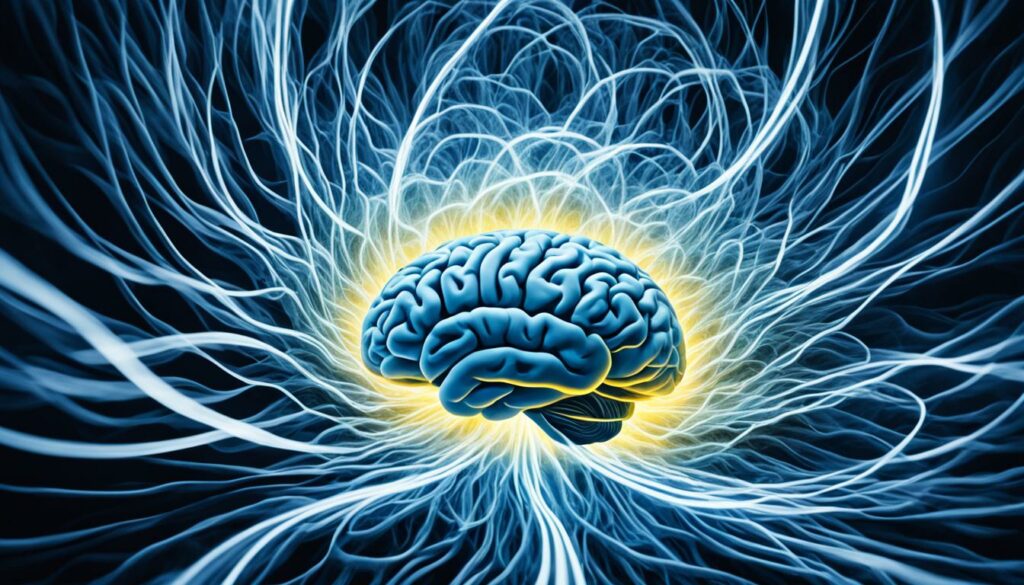
The reticular activating system (RAS) is a crucial component in the brain responsible for waking up and maintaining wakefulness. As the brain’s gatekeeper, the RAS filters information and activates other regions of the brain, allowing us to transition from sleep to wakefulness. The RAS is sensitive to signals both from our bodies and the external environment. For example, it can sense the need to go to the bathroom or respond to the sound of an alarm clock.
When the RAS is activated, it takes time for the entire brain and body to fully wake up. This gradual awakening process occurs as the “sleepy” neurochemicals dissipate. Waking up during deeper stages of sleep can result in grogginess or sleep inertia, while waking up during lighter stages can leave us feeling refreshed and energized.
Tracking sleep stages and optimizing wake-up times has become easier with advancements in technology. Devices and apps can monitor sleep patterns and wake individuals during the optimal phase of the sleep-wake cycle, promoting a smoother transition from slumber to alertness.
To better understand the awakening process in the brain, let’s take a look at this table showcasing the stages of sleep and their associated characteristics:
| Sleep Stage | Brainwave Patterns | Characteristics |
|---|---|---|
| Stage 1 (Transition) | Theta waves | Light sleep, easily awakened |
| Stage 2 | Sleep spindles and K-complexes | Deeper sleep, reduced brain activity |
| Stage 3 (Deep Sleep) | Delta waves | Deepest sleep, essential for restoration and growth |
| REM Sleep | Theta and beta waves | Active dreaming, increased brain activity |
Understanding the brain’s awakening process and the various sleep stages is vital for promoting optimal cognitive function and well-being throughout the day.
Understanding Sleep Stages
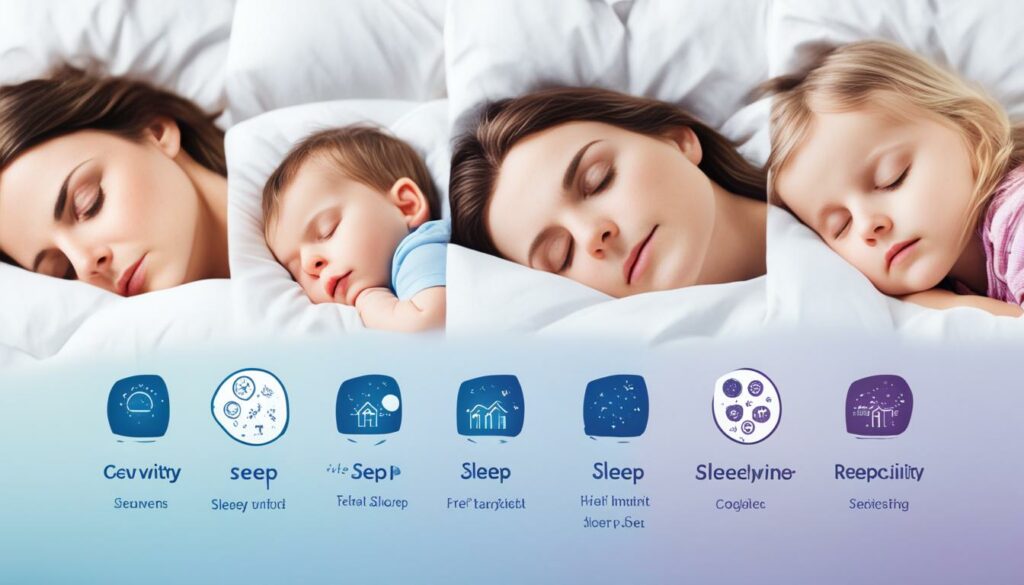
Sleep is a complex process that consists of different stages, each serving a unique purpose in the restoration and maintenance of our bodies and minds. Let’s dive into the intricacies of sleep stages and explore the fascinating world of REM sleep and non-REM sleep.
REM Sleep: A Window to Dreams
REM (rapid eye movement) sleep is the stage where dreams typically occur. During this stage, the brain exhibits high levels of activity resembling wakefulness, while the body remains mostly paralyzed. It is during REM sleep that our most vivid and memorable dreams take place. This stage plays a crucial role in memory consolidation, emotional regulation, and overall cognitive function.
REM sleep is characterized by rapid eye movements, increased heart rate, irregular breathing, and enhanced brain activity. The brain waves observed during this stage resemble those seen when we are awake, making it a unique and captivating phase of sleep.
Non-REM Sleep: The Foundation of Restorative Sleep
Non-REM sleep consists of three stages, each characterized by distinct brainwave patterns and physiological changes. These stages contribute to the overall restoration and rejuvenation of our bodies and minds.
Stage 1: This is the transition phase between wakefulness and sleep. It is a brief period of drowsiness where brain activity begins to slow down. During this stage, we may experience hypnagogic hallucinations or sudden muscle contractions known as hypnic jerks.
Stage 2: The majority of our sleep is spent in stage 2. This is a period of light sleep characterized by the presence of sleep spindles and K-complexes on an EEG (electroencephalogram) reading. Our body temperature drops, and our heart rate and breathing become more regular.
Stage 3: Also known as deep sleep or slow-wave sleep, stage 3 is the most restorative stage of sleep. During this phase, our brain waves slow down even further, and our body undergoes essential repairs and rejuvenation. Tissue growth and repair, hormone release, and energy restoration all occur during this stage.
The sleep cycle consists of multiple transitions between REM sleep and the various non-REM sleep stages. The first cycle typically starts with a longer period of non-REM sleep, followed by shorter REM sleep periods. As the night progresses, REM sleep periods become longer and more frequent.
The Brain’s Control System for Sleep
Sleep is regulated by two main systems: sleep-wake homeostasis and the circadian rhythm. These systems work in harmony to ensure a proper balance of sleep and wakefulness.
Sleep-Wake Homeostasis
The sleep-wake homeostasis system tracks the need for sleep and regulates sleep intensity. It creates a sleep drive that gradually increases with each waking hour, signaling the body’s need for rest. This sleep drive promotes longer and deeper sleep after a period of sleep deprivation. It ensures that the body replenishes its energy reserves and repairs any cellular damage that may have occurred during wakefulness.
The Circadian Rhythm
The circadian rhythm, controlled by the body’s biological clock, plays a vital role in regulating sleep-wake cycles. This internal clock synchronizes our sleep patterns with environmental cues, primarily light. Specialized cells in the retinas of our eyes process light and inform the brain about the time of day. This information helps the brain adjust the timing of sleep and wakefulness to align with our natural sleep-wake cycle.
A disrupted circadian rhythm can impact sleep quality and lead to difficulties falling asleep or staying asleep. Shift work, frequent travel across time zones, and exposure to artificial light at night can disrupt the body’s natural sleep-wake patterns, causing sleep disturbances and fatigue.
The Role of the Reticular Activating System
One key player in the brain’s control system for sleep is the reticular activating system (RAS). The RAS acts as a gatekeeper, filtering information from various sensory channels and alerting the rest of the brain to the need for wakefulness. It helps in the process of transitioning from sleep to wakefulness by gradually rousing the brain from a state of sleepiness.
The RAS receives input from the body, such as the need to use the bathroom or respond to external stimuli like alarms. When the RAS is activated, it triggers the release of neurotransmitters and hormones that promote wakefulness and increase the brain’s overall activity level.
| Sleep Regulation Systems | Description |
|---|---|
| Sleep-Wake Homeostasis | Tracks the need for sleep and regulates sleep intensity |
| The Circadian Rhythm | Synchronizes sleep-wake cycles with environmental cues, primarily light |
| The Reticular Activating System | Acts as a gatekeeper, filtering information and promoting wakefulness |
By understanding the brain’s control system for sleep, we can make informed choices about our sleep habits, optimize our sleep-wake schedules, and improve our overall sleep quality. Prioritizing a consistent sleep routine, minimizing exposure to disruptive light sources before bed, and creating a comfortable sleep environment can greatly support the brain’s natural sleep regulation processes.
Sleep Needs Across the Lifespan

Understanding sleep needs is essential for maintaining optimal health and well-being at every stage of life. Sleep duration and requirements vary depending on age and individual differences. Let’s explore the sleep needs across different age groups:
1. Babies and Infants:
Babies require the most sleep, averaging 16 to 18 hours a day. This extended sleep duration is crucial for their growth, brain development, and immune system functioning. Their sleep is typically spread out in short periods throughout the day and night.
2. School-age Children and Teenagers:
School-age children and teenagers need around 9.5 hours of sleep per night to support their physical and cognitive development. Adequate sleep helps enhance concentration, memory, and academic performance. Establishing a consistent sleep routine is vital during this stage.
3. Adults:
Most adults require 7 to 9 hours of sleep for optimal functioning. However, individual variations exist, and some adults may need slightly more or less sleep to feel refreshed. Prioritizing regular sleep patterns, creating a conducive sleep environment, and managing stress contribute to better sleep quality.
4. Older Adults:
Older adults, typically aged 60 and above, may experience changes in their sleep patterns. Nighttime sleep may become shorter and lighter, often accompanied by multiple awakenings. These age-related changes in sleep can be influenced by various factors, including medical conditions, medications, stress, and sleep environment.
It’s important to note that sleep needs are not solely determined by age, but are also influenced by other lifestyle factors. Factors such as overall health, physical activity levels, and exposure to natural light affect sleep duration and quality.
Sleep Needs Across the Lifespan:
| Age Group | Average Recommended Sleep Duration |
|---|---|
| Babies (0-3 months) | 16 – 18 hours |
| Infants (4-11 months) | 12 – 15 hours |
| Toddlers (1-2 years) | 11 – 14 hours |
| Preschoolers (3-5 years) | 10 – 13 hours |
| School-age Children (6-13 years) | 9 – 11 hours |
| Teenagers (14-17 years) | 8 – 10 hours |
| Adults (18-64 years) | 7 – 9 hours |
| Older Adults (65+ years) | 7 – 8 hours |
Achieving adequate sleep duration and quality is essential for overall health and well-being at every stage of life. Prioritizing regular and consistent sleep patterns, creating a sleep-friendly environment, and adopting healthy sleep habits contribute to better sleep and improved cognitive performance.
Sleep and Brain Awareness in the Waking Process
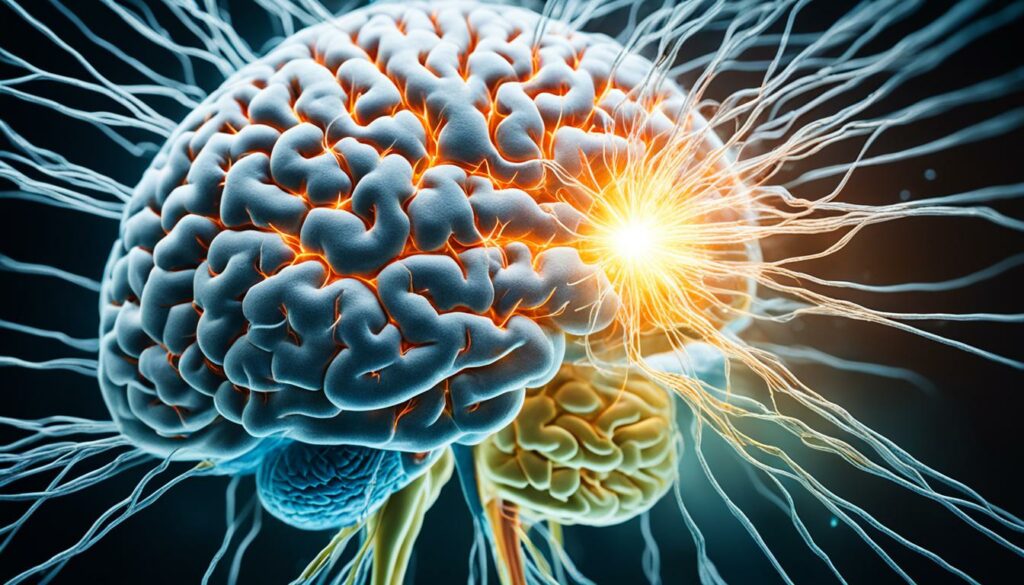
Scientists employ electroencephalography (EEG) to study the brain’s activity during the transition from sleep to wakefulness. EEG enables the measurement of electrical signals generated by brain cells, providing valuable insights into brain activity dynamics. Contrary to the common perception of the brain being “turned off” during sleep, it exhibits significant activity and follows distinct patterns corresponding to different sleep stages.
The brain’s awakening process is facilitated by the reticular activating system (RAS), which plays a crucial role in filtering important information and triggering wakefulness in other brain regions. This system is responsible for maintaining alertness throughout the day and ensures a smooth transition from sleep to wakefulness. EEG measurements show significant changes in brain activity during this process, as the brain prepares to fully engage in conscious cognitive functioning.
“The brain’s awakening process involves intricate dynamics, as the RAS filters important information and triggers wakefulness in various brain regions.”
By examining EEG readings, scientists can observe the gradual increase in brain activity as an individual transitions from sleep to wakefulness. EEG measurements also provide insights into the different stages of sleep and their corresponding brain activity patterns, helping us better understand the complex nature of the waking process. Moreover, EEG data can be used to assess the quality of awakening and evaluate the effects of external factors, such as sleep disorders or medication, on brain activity during waking.
Overall, EEG measurements offer valuable information about brain awakening and the intricate interplay between sleep and wakefulness. By analyzing these electrical signals, scientists continue to deepen our understanding of the brain’s functioning during the transition from sleep to wakefulness, unraveling the mysteries of consciousness and cognitive performance.
The Role of Neurochemicals in Sleep and Wakefulness
Neurochemicals play a crucial role in regulating sleep and wakefulness. These chemical messengers in the brain are responsible for facilitating the complex processes that occur during different sleep stages and sleep-wake transitions.
During sleep, the brain undergoes various neurochemical changes that correspond to different stages of sleep. These changes are necessary for the maintenance and regulation of sleep. For example, the neurotransmitter GABA (gamma-aminobutyric acid) inhibits activity in arousal centers, promoting sleep and relaxation.
When it comes to sleep-wake transitions, a variety of neurochemicals are involved in triggering and regulating wakefulness. Norepinephrine, histamine, and serotonin are among the key neurotransmitters associated with wakefulness and alertness.
The interplay between neurochemicals and brain regions is vital for facilitating changes in consciousness and alertness. These chemicals interact with specific neural pathways to promote the transitions between sleep and wakefulness.
Understanding the role of neurochemicals in sleep and wakefulness is essential for optimizing sleep quality and overall brain function. By identifying and targeting these key chemical messengers, researchers and healthcare professionals can develop interventions to improve sleep disorders and promote healthy sleep patterns.
Sleeping and Waking Mysteries
Despite extensive research, the purpose of sleep and the mechanisms behind consciousness remain mysteries. Sleep is essential for health, including immune system functioning, memory consolidation, and mental well-being. However, the exact functions and mechanisms underlying sleep are still not fully understood. The brain’s generation of consciousness is a complex puzzle that scientists continue to unravel. Curiosity and scientific exploration are needed to advance our understanding of these fascinating phenomena.
| Components | Intriguing Questions |
|---|---|
| Purpose of Sleep | What is the precise function of sleep? Why do we spend a substantial part of our lives asleep? |
| Consciousness Generation | How does the brain generate consciousness? What neural processes are responsible for our subjective experience of reality? |
| Sleep Disorders | What causes sleep disorders such as insomnia, sleep apnea, and narcolepsy? How can we develop more effective treatments? |
| Dreaming | What purposes does dreaming serve? How does dreaming contribute to cognitive and emotional processing? |
The exploration of sleep and consciousness is a fascinating field that continues to captivate researchers worldwide. While we may not have all the answers yet, ongoing scientific advancements offer hope for unraveling these enigmatic phenomena. By delving deeper into these mysteries, we can unlock a greater understanding of the brain and its intricate workings, opening doors to improved health, well-being, and cognitive potential.
Conclusion
The brain’s wake-up time is influenced by the circadian rhythm, neurotransmitters, and sleep stages. Understanding these processes is crucial for optimizing brain function and overall well-being. Prioritizing regular sleep, exposure to natural light, and maintaining a consistent sleep schedule can promote optimal wake-up times and cognitive performance throughout the day.
By aligning our sleep habits with our biological clock, we can harness the power of our circadian rhythm to enhance productivity and mental clarity. Adequate sleep, including the different sleep stages, allows the brain to recharge, consolidate memories, and clear out toxins. It is important to recognize that lack of quality sleep can negatively impact brain function, mood, and overall health.
Although scientists have made great strides in understanding the brain’s wakefulness and the importance of sleep, there are still many mysteries to unravel. Ongoing research and scientific exploration hold the key to uncovering the intricate mechanisms behind sleep and wakefulness. As we continue to delve into these mysteries, we can further optimize our sleep routines and unlock the full potential of our brain’s wake-up time.
FAQ
What influences the brain’s wake-up time?
The brain’s wake-up time is influenced by the circadian rhythm, which regulates sleep-wake cycles. Neurotransmitters in the brain, such as norepinephrine, histamine, and serotonin, also play a role in keeping the brain alert and functioning while awake.
How does sleep affect brain function?
Sleep is crucial for brain health and function. During sleep, the brain strengthens neural connections important for learning and memory and clears out toxins that accumulate during waking hours. Different sleep stages, such as REM sleep and non-REM sleep, are associated with specific brainwave patterns and neurochemicals.
What controls the brain’s awakening process?
The reticular activating system (RAS) in the brain is responsible for waking up and maintaining wakefulness. It acts as a gatekeeper, filtering information and waking up other parts of the brain. The RAS can sense signals from the body and external cues, like alarm clocks, to initiate wakefulness.
What are the different sleep stages?
Sleep consists of REM (rapid eye movement) sleep and non-REM sleep. REM sleep is when dreaming occurs and brain activity resembles wakefulness. Non-REM sleep has three stages, with each stage characterized by specific brainwave patterns and physiological changes.
How is sleep regulated?
Sleep is regulated by two main systems: sleep-wake homeostasis and the circadian rhythm. Sleep-wake homeostasis tracks the need for sleep and regulates sleep intensity. The circadian rhythm, controlled by the body’s biological clock, synchronizes sleep-wake cycles with environmental cues, primarily light.
How much sleep do different age groups need?
Sleep needs vary with age and individual differences. Babies sleep the most, averaging 16 to 18 hours a day. School-age children and teenagers require around 9.5 hours of sleep per night. Most adults need 7 to 9 hours of sleep, but older adults may experience changes in sleep patterns.
How is brain activity measured during sleep and wakefulness?
Scientists use techniques like electroencephalography (EEG) to measure the brain’s activity during the transition from sleep to wakefulness. EEG measures the electrical signals generated by brain cells, providing insights into brainwave patterns and activity.
What role do neurochemicals play in sleep and wakefulness?
Neurochemicals in the brain help regulate sleep and wakefulness. Different sleep stages are associated with specific patterns of these chemicals. For example, GABA promotes sleep by reducing activity in arousal centers. Neurotransmitters like norepinephrine, histamine, and serotonin are involved in wakefulness and alertness.
What are some mysteries surrounding sleep and waking?
Despite extensive research, the purpose of sleep and the mechanisms behind consciousness are still not fully understood. Sleep is essential for health, including immune system functioning and memory consolidation. The brain’s generation of consciousness remains a complex puzzle that scientists continue to investigate.
What is the importance of understanding the brain’s wake-up time?
Understanding the processes and mechanisms involved in waking up and transitioning between sleep and wakefulness is important for optimizing brain function and overall well-being. Prioritizing regular and adequate sleep, exposure to natural light, and maintaining a consistent sleep schedule can help promote optimal wake-up times and cognitive performance.

